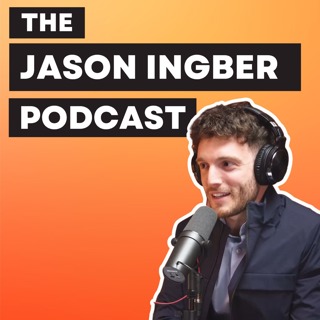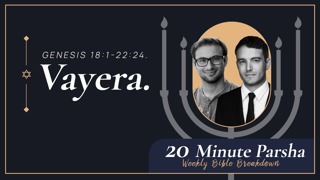
What They Don't Teach You In Law School
In this episode, we delve into the fascinating career of Elizabeth Munro Farrugia, an accomplished trial lawyer licensed in Florida and California. Elizabeth is interviewed by UCLA law graduate Jennifer Milazzo and yours truly Jason Ingber, where they discuss Elizabeth's inspirations to pursue law, her experiences in different states, and her transition from an intern to a managing attorney. Elizabeth shares insightful stories, including her time in family law, the lessons learned from her mentors, and her approach to client advocacy. The conversation touches on various aspects of legal practice, from trial preparation and courtroom strategies to maintaining civility and integrity in the profession. A must-watch for anyone interested in a career in law or intrigued by the nuances of legal practice. 00:42 Introduction and Guest Introduction 01:54 Early Influences and Law School Journey 02:41 Internship Experiences and Lessons Learned 07:17 Differences in Legal Practice Across States 09:22 Career Transition to California 15:40 Starting Fresh in California 24:31 Mentorship and Early Experiences 25:12 Trial Preparation and Workload 27:21 Memorable Cases and Strategies 34:41 Differences in Legal Practice: Florida vs. California 36:29 Connecting with Clients 39:18 Effective Courtroom Techniques 4 5:10 Voir Dire and Jury Selection 48:53 Maintaining Integrity in Legal Practice Like, Share & Subscribe - The Jason Ingber Show
23 Dec 202450min

Celine Rouben - Israel and Palestine Occupation Legal Status
Celine is an activist abd attorney and I push her to articulate the Israeli perspecitve on the terms "settlers" "occupation" and "nakba" and explain the answers to legal challenges Israel faces in the international community.
22 Dec 20241h 32min

Parsha Uncensored: Toldot Featuring Michael Borkow
Why did Isaac favor Esav? Why all the subterfuge? Rabbi Levine and I explore this and more with our guest Michael Borkow in this timeless conversation.
29 Nov 202427min

Parsha Uncensored - Chaya Sara
Analzying Abraham's real estate purchase, the matriacrchy and more with Rabbi Daniel Levine
29 Nov 202414min

Parsha Uncensored: Vaera
Sodom. Gmora. The Akeida. Is sacrificing your child... Is obedience a failure?
15 Nov 202432min

Parsha Uncensored: Lech L'cha
Abraham must go out of his father's home to become a great nation.
15 Nov 20242min

Negar Matian Esq.: Work Life Harmony
Negar and her daughter describe their POV on Negar building her firm while mothering, divorcing and empowering her family.
4 Nov 20241h 17min

20 Minute Parsha (Weekly Bible Study) - Noah
Here’s an epic summary. Noah descends from Adam’s third son with Eve. Seth. At 500 years old, he starts to save the world. The men were so wicked God regrets man. Noah was righteous. God tells him to build a boat! He builds a boat to God’s specs for 100 years with huge hammers. He boards many animals. For 40 days and 40 nights they buoy mighty rough waters. The waters corrode every living thing. God forgets Noah for 150 days. Noah uses a raven and a dove to scout for land. After a year they reach land, and he opens the ark and deboards. Noah sacrifices animals. God loves the smell. God blesses Noah: 1. His family’ll be fruitful and multiply, 2. They’re at the top of all food chains (just don’t eat something with blood while it’s alive) and 3. God promises to never destroy all flesh and earth like that flood ever again and a rainbow is consideration. Noah plants a vineyard. He invents wine! He drinks it one night to a stupor and falls asleep naked. Ham sleeps with Noah. Noah’s other two sons know and awkwardly, with their backs turned, put up a curtain. Noah sobers up and curses Ham. The bloody interpersonal mess! Does Noah’s wife find out about the hanky panky? God, why did Noah fuck with his kid? We literally never find out. God doesn’t utter a word. God, that heaves 40 days of sulfur-rain to boil his earth for 150 days says nothing re: Ham and Noah’s issue. It’s possible the embarrassing act was not sexual and only a lesser level sin. Ham brought dishonor to Noah. God chooses to let them work it out amongst themselves. It’s nice God didn’t insert himself. A powerful sequence. Noah saves humanity. Learns to garden. Gets drunk off the fruits of his labor and suffers interpersonal depravity. God lets Noah work it out with his son and stays out of it. Noah appears to live his last 350 years scandal-free. Nothing further to report. We don’t hear from Noah ever again after he curses Ham. Noah’s descendants say "Come, let us build ourselves a city and a tower with its top in the heavens, and let us make a name for ourselves, lest we be dispersed over the face of the whole earth." And God says, "Behold, they are one people, and they have all one language, and this is only the beginning of what they will do. And nothing that they propose to do will now be impossible for them. Come, let us go down and there confuse their language, so that they may not understand one another 's speech." That’s all folks. End of Chapter Noah. To recap. Man was in Eden. Man and wifey sin. Then their son kills their other son. Adam and Eve have a third son, Seth. Seth births Noah who births Babel Toweronians that attempt to build to the heavens to make their mark. They get dispersed and new languages. Many questions. Why would Noah curse a third of his own bloodline to slavery?? Why did God oppose the tower builders? I have no answers but there’s a thin common thread worth a pull to bunch these stories together. A family goes through a storm. They come out unified; enjoying the entire earth to themselves. The joy ferments to sin. In Noah’s rage he punishes: via language. Ham you’re a slave. Ham you’re different than us. This would seem to permanently divide his family. It does not. The men grow so unified and productive that they aspire to build their city to the heavens. They’re share a fear they won’t make their mark on the world. God fulfills their fear. He disperses them and divides their spirt with foreign languages. An immediate barrier to cooperation is distance. A permanent barrier is a block to understand someone else. The lessons are clear. Build a boat for your family and things you love. Work hard and enjoy the fat of the land, but don’t get drunk off it. If your kid dishonors you don’t curse him out, and if you do, the family will still stay together forever. When we cooperate with each other, and we feel understood, we rival divine power.
1 Nov 202424min





















